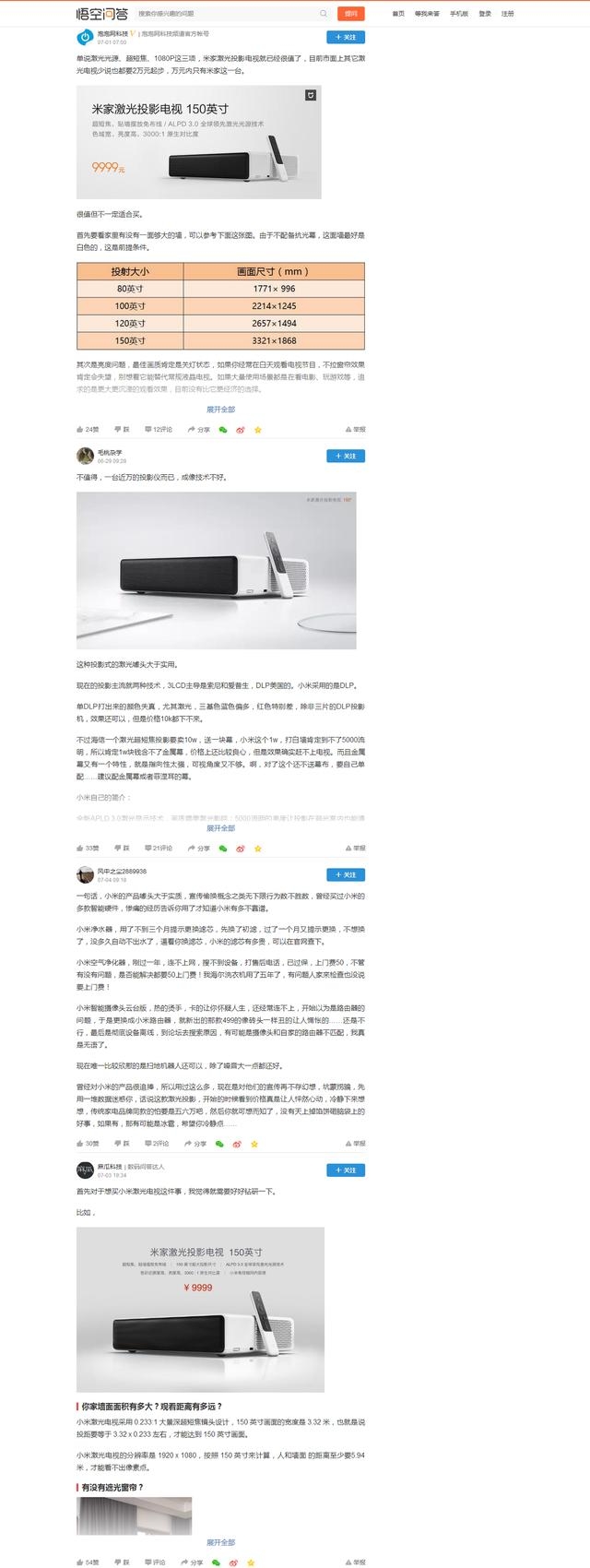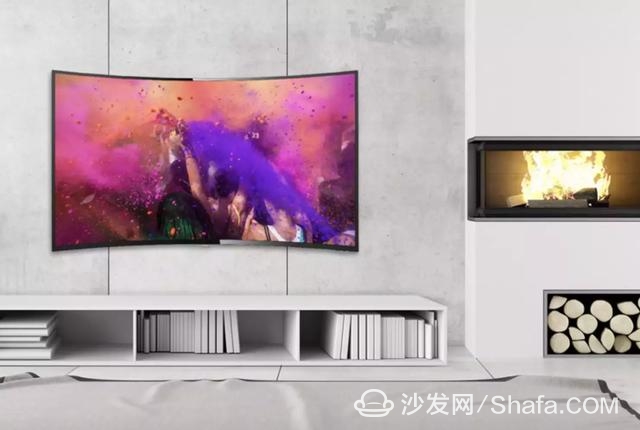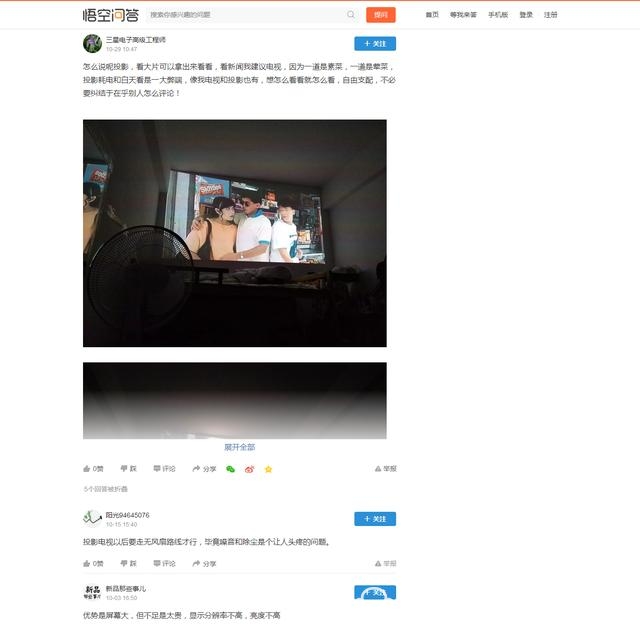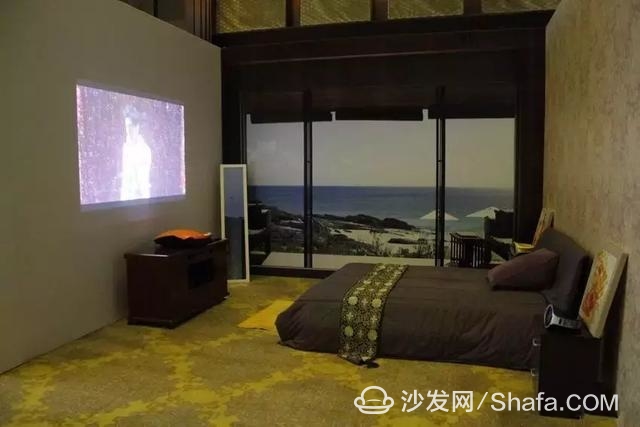In the past, there was a device that sat between a smartphone and a tablet—a hybrid known as a "tablet phone." The National People’s Congress even debated whether tablets would shrink over time or if phones would grow larger. The lines between the two blurred until smartphones reached screens of 5.5 inches. Initially, major brands launched their "plus" series, and no one ever spoke of a tablet phone again. But this year, a similar trend hit the TV industry, especially in laser projection TVs. Compared to traditional TVs, Mijia’s 150-inch model seems overly ambitious, but some projectors can be adjusted from 40 to 300 inches, making them a favorite among tech enthusiasts.
 Projection TVs are compact and portable. Most importantly, they only need a wall to project onto, allowing you to watch anytime. To younger generations, this feels cool, trendy, and convenient—especially for those with limited space. For families who want a large-screen experience, the flexibility of projection TVs makes them an appealing choice. Is it really true that projection TVs are so powerful they could replace traditional TVs? Are they worth buying? Is bigger always better? A 150-inch screen sounds exciting, but what do real users think? Let’s check out some comments from the Wukong Q&A platform.
Projection TVs are compact and portable. Most importantly, they only need a wall to project onto, allowing you to watch anytime. To younger generations, this feels cool, trendy, and convenient—especially for those with limited space. For families who want a large-screen experience, the flexibility of projection TVs makes them an appealing choice. Is it really true that projection TVs are so powerful they could replace traditional TVs? Are they worth buying? Is bigger always better? A 150-inch screen sounds exciting, but what do real users think? Let’s check out some comments from the Wukong Q&A platform.
 In fact, television isn’t the only thing getting bigger. In the living room, which is the most common space for entertainment, a TV is almost essential. Without a noticeable TV on the wall, it might feel incomplete, even if someone like my mom rarely watches TV more than twice a week. For many, the TV is a central part of home entertainment culture. Changing long-standing habits will take time.
In fact, television isn’t the only thing getting bigger. In the living room, which is the most common space for entertainment, a TV is almost essential. Without a noticeable TV on the wall, it might feel incomplete, even if someone like my mom rarely watches TV more than twice a week. For many, the TV is a central part of home entertainment culture. Changing long-standing habits will take time.
 For me, a 60-inch TV is more than enough. I grew up watching regular TVs, and I still prefer the classic look. A huge wall-mounted TV doesn't always look good. In most homes, a 30-seat living room doesn't need a 100-inch or larger screen. Sitting too close to a massive screen can strain your eyes, and the human eye can't fully process the entire image at once. It just enters the visual field all at once.
For me, a 60-inch TV is more than enough. I grew up watching regular TVs, and I still prefer the classic look. A huge wall-mounted TV doesn't always look good. In most homes, a 30-seat living room doesn't need a 100-inch or larger screen. Sitting too close to a massive screen can strain your eyes, and the human eye can't fully process the entire image at once. It just enters the visual field all at once.
 Projection TVs may have flashy features, but their actual benefits are questionable. Plus, they challenge people's preferences for traditional screens. With prices ranging from tens of thousands to hundreds of thousands, they can be intimidating for average consumers. Many people call them "black tech," but end up buying from established brands like Philips because of reliability and after-sales support. If something breaks, you want it fixed quickly. However, with projection TVs, the technology is still new, and the market is unstable. Ensuring good after-sales service is a big concern. No one wants to take that risk. Is a projector TV really worth it? There are plenty of opinions on the “Goku Questions and Answers.â€
Projection TVs may have flashy features, but their actual benefits are questionable. Plus, they challenge people's preferences for traditional screens. With prices ranging from tens of thousands to hundreds of thousands, they can be intimidating for average consumers. Many people call them "black tech," but end up buying from established brands like Philips because of reliability and after-sales support. If something breaks, you want it fixed quickly. However, with projection TVs, the technology is still new, and the market is unstable. Ensuring good after-sales service is a big concern. No one wants to take that risk. Is a projector TV really worth it? There are plenty of opinions on the “Goku Questions and Answers.â€
 Can projection TVs truly surpass traditional TVs in image quality? Consumers who have the budget and love trying new things care most about the image quality. Some say it feels like being in a private cinema, as advertised. But the difference is that projection TVs cast images directly onto walls or curtains. The quality of the surface, light reflectance, and white balance all affect the final result. The screen is also sensitive to environmental factors, which can lead to unsatisfactory image quality.
Can projection TVs truly surpass traditional TVs in image quality? Consumers who have the budget and love trying new things care most about the image quality. Some say it feels like being in a private cinema, as advertised. But the difference is that projection TVs cast images directly onto walls or curtains. The quality of the surface, light reflectance, and white balance all affect the final result. The screen is also sensitive to environmental factors, which can lead to unsatisfactory image quality.
 During use, if someone walks in front of the projector or the screen, it can greatly impact the viewing experience. Also, the strong light from the projector could potentially harm the eyes. These side effects make traditional TVs a safer bet.
Currently, only a few brands produce projection TVs. Consumers often choose between similar models, and the differences between basic and high-end versions are not significant. Yet the price varies widely. Most manufacturers are still in early stages, and their technology isn’t mature enough to deliver 4K or 8K quality. So why aren’t traditional TV makers entering this space? That might be the reason—it’s better not to do it if you can’t do it well.
For smart TV and box information, visit Smart TV/box network (http://), China’s leading platform for TV boxes and smart TVs, offering news, reviews, software, and more. Get answers to all your questions.
During use, if someone walks in front of the projector or the screen, it can greatly impact the viewing experience. Also, the strong light from the projector could potentially harm the eyes. These side effects make traditional TVs a safer bet.
Currently, only a few brands produce projection TVs. Consumers often choose between similar models, and the differences between basic and high-end versions are not significant. Yet the price varies widely. Most manufacturers are still in early stages, and their technology isn’t mature enough to deliver 4K or 8K quality. So why aren’t traditional TV makers entering this space? That might be the reason—it’s better not to do it if you can’t do it well.
For smart TV and box information, visit Smart TV/box network (http://), China’s leading platform for TV boxes and smart TVs, offering news, reviews, software, and more. Get answers to all your questions.






Siren Alarm, Car Siren, Home Security Alarm, Bargular Alarm, Fire alarm, Car security System, Personal security Alarm
Siren Alarm,Outdoor Siren,Wireless Siren,Home Alarm Siren
NINGBO SANCO ELECTRONICS CO., LTD. , https://www.sancobuzzer.com